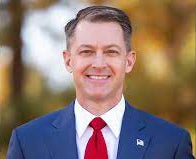Voting coalition opposes Allen’s bill
Published 7:08 pm Monday, March 14, 2022
|
Getting your Trinity Audio player ready...
|
Rep. Wes Allen’s “Zuckerbucks” bill has come under fire from the Alabama Voting Rights Coalition.
Allen’s bill, House Bill 194, was passed by the House of Representatives on Thursday, and Allen said the bill was aimed at preventing private individuals or organizations from influencing elections.

Wes Allen
However, the Alabama Voting Rights Coalition maintains the bill will directly impact the way they provide Alabamians with voter education programs “making it an attack on democracy through voter suppression.”
The Coalition released a statement that read. “HB 194 would make it illegal for grassroots organizations to collaborate with local elections officials to educate and help voters get out the vote. This means that churches, nonprofits and other civic organizations would be prohibited from filling the gaps and helping Alabamians have the resources to get out the vote.”
Allen said the Coalition is blatantly spreading falsehoods about the bill.
“It is unfortunate that groups like the Alabama Voting Rights Coalition find it necessary to send out a press release that they know if full of falsehoods,” Allen said. “HB 194 does not, in any way, make it illegal for grassroots organizations to collaborate with local elections officials to educate and help voters ‘get out the vote,’ as they claimed in their press release. HB194 does make it illegal for these groups to compensate an elected official or to purchase election equipment or to purchase ballots or other elections supplies. If this group would like to have a voter registration drive and invite their local probate judge or secretary of state to participate, nothing in this bill would stop that. It does, however, prevent them from paying that election official to be there.
“HB194 prohibits the elected officials who are responsible for the administration of elections to take donations or compensation related to equipment, supplies or salaries regarding the election. The Alabama Voting Rights Coalition should issue a public apology to the people of Alabama for the continued falsehoods they are intentionally spreading.”
Allen’s bill is similar to a slew of bills being developed in other states to prevent outside influences from affecting the outcome of an election. During the 2020 election cycle, Facebook Founder and CEO Mark Zuckerberg channeled $350 million through the Center for Tech and Civic Life to county election officials through a series of grants which were to be used for polling place maintenance, personal protective equipment, voter outreach and education, poll worker recruitment and training and expanded access to mail-in voting. The money was to be used to ensure safe polling places during the pandemic.
However, Allen said these grants were distributed almost entirely to Democrat-leaning counties, including seven counties in Alabama. The seven counties ‑ Bullock, Dallas, Hale, Jefferson, Macon, Montgomery, and Wilcox ‑ were won by Joe Biden in 2020.
In addition, a 2020 study by the Amistad Project identified the CTCL’s 20 largest publicly identified donations which total $76.5 million. All these funds went to areas that Hillary Clinton won in 2016. In addition, large amounts of these grants went to Democratic areas in the swing states of Pennsylvania, Minnesota, and Wisconsin.
Since 2020, 14 states – Arizona, Arkansas, Florida, Georgia, Idaho, Indiana, Kansas, Mississippi, North Dakota, Ohio, Oklahoma, South Dakota, Tennessee and Texas – have passed bills banning or regulating Zuckerbucks. Virginia also passed a bill, which is awaiting the signature of Republican Gov. Glen Youngkins.
Kansas Democrat Gov. Laura Kelly’s veto was overridden. Five other states also passed legislation that was vetoed by Democratic Govs. Bel Edwards (Louisiana), Gretchen Whitmer (Michigan), Roy Cooper (North Carolina), Tom Wolf (Pennsylvania) and Tony Evars (Wisconsin).
Similar legislatin failed in Missouri, Monmtana and Wyoming.
Allen’s bill is in progress in Alabama and similar bills are in the legislsative process in Iowa, Kentucky, Minnesota, South Carolina and West Virginia.
Allen’s bill would make it a Class B misdemeanor for any “state or local public official responsible for the conduct of an election, nor his or her employee, to solicit, accept, or use any donation in the form of money, grants, property, or personal services from an individual or a nongovernmental entity for the purpose of funding election-related expenses or voter education, voter outreach, or voter registration programs.”
Allen’s bill passed the House 72-28 – along party lines – and will go to the Alabama Senate for consideration.
The Alabama Voting Rights Coalition plans to continue to fight the bill in the Senate.
“The effect of HB 194 will be to create uncertainty and doubt with election officials and with our volunteers,” Kathy Jones, president of the League of Women Voters Alabama, said. “It would undoubtedly suppress voter registration and voter turnout. Alabama should encourage civic engagement and participation in our democracy without sowing doubt, fear, and division.”
The Alabama Voting Rights Coalition, in partnership with Alabama Values Progress, will host a public briefing on HB 194, which will be streamed online on YouTube and the AVRC Facebook page at 11 a.m., on Tuesday, March 15, 2022.”




